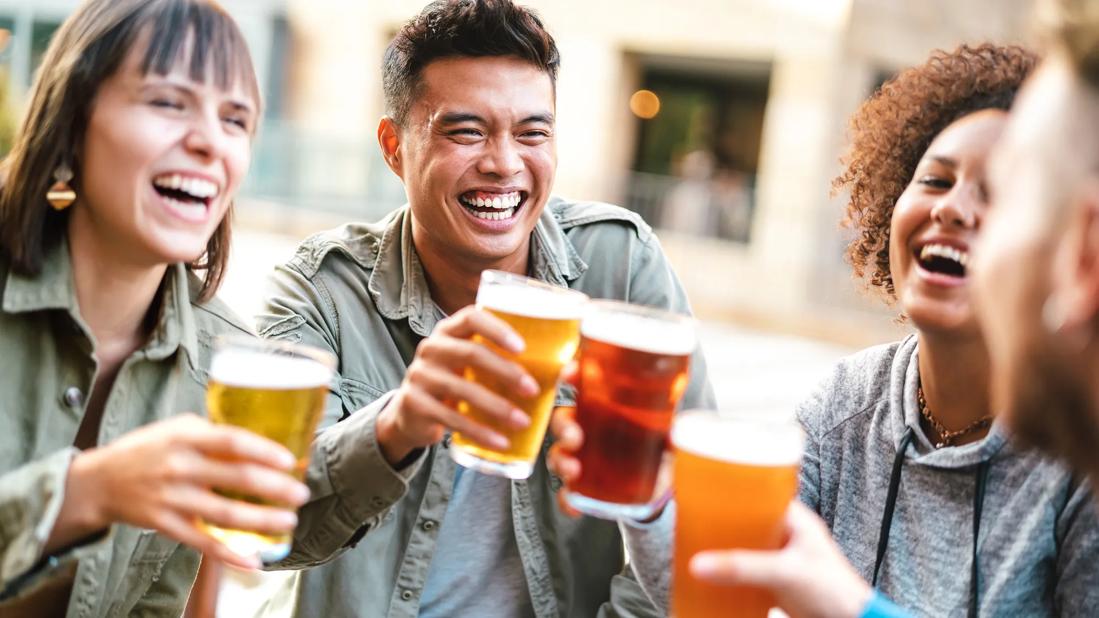Alcohol provides empty calories, heightens cravings and may slow down your metabolism

Image content: This image is available to view online.
View image online (https://assets.clevelandclinic.org/transform/414f8605-3101-4cc1-b909-0b3118573f2e/1345972534)
Group of happy, smiling friends raising a toast with glasses of beer
If you’re working on losing weight, then you know it can involve a lot of ups and downs (literally). You’ve likely considered what you’re eating, what you’re not eating and of course, how much you’re moving. And if you drink alcohol, you may have thought about that as well.
Advertisement
Cleveland Clinic is a non-profit academic medical center. Advertising on our site helps support our mission. We do not endorse non-Cleveland Clinic products or services. Policy
How exactly does alcohol factor in? Can having a beer with your co-workers or a glass of wine when you get home make a big impact on the number on the scale?
“Alcohol has calories,” explains psychiatrist Leslie Heinberg, PhD. “And depending on what we’re drinking, the number of calories can be excessive.”
So, yeah, you’ve probably heard that alcohol has empty calories. But how many happy-hour cocktails really make a difference?
A 2019 study looked at how our relationship with alcohol might be associated with obesity. Researchers examined results from men and women who took part in a national nutrition survey. They compared how much alcohol participants drank in the past year, their weight status and if they were attempting to lose weight.
Here’s the kicker: The study connected weight gain not with how often you drink but with how much you drink in one sitting. “For both men and women, the individuals who drink more often actually had lower rates of obesity,” shares Dr. Heinberg, who did not take part in the study.
“But the results showed that for women, heavier drinking, or binge drinking, was associated with an increased risk of obesity.”
Women who participated in binge drinking were not only more likely to have obesity but were also more likely to be attempting weight loss.
Advertisement
You may already be aware of some of the more unsavory side effects of alcohol, especially when you overdo it. It can increase anxiety, heighten your blood pressure and even affect your brain. But there are a few specific ways it can affect your weight, too.
Alcohol can affect your weight by:
“Often, any beverages are a big source of empty calories — whether it’s soda, juice, sweet tea, beer, wine or cocktails,” she clarifies. “Any of those things add calories, but really, without nutrition and without the sense of feeling full.”
To give you an idea, here’s about how many calories are in common alcoholic drinks:
And when it comes to sweeter drinks like pina coladas, those can get you up to 500 calories for a 7-ounce glass (or more!).
“Across the board, for people who are trying to lose some weight, cutting out empty calories is a good place to start,” emphasizes Dr. Heinberg.
But will drinking any alcohol prevent you from losing any unwanted fat? Not necessarily. You can strike a balance if you’re looking to lose weight while still enjoying an occasional drink with friends.
Dr. Heinberg adds that it’s a good idea to develop healthy alcohol habits early in adulthood. “That’s because binge drinking at any age is likely to set us up for health problems down the road.”
Here are some strategies to help you balance alcohol consumption while pursuing weight loss:
Advertisement
By working in these strategies, you can still enjoy alcohol in moderation while working toward your weight loss goals.
If you’re looking to lose weight, you may not need to cut out alcohol completely. But cutting back on your alcohol intake can have plenty of health benefits either way. And from what we know, it won’t exactly hurt your weight loss journey. If you do plan to drink, there are ways to reduce your intake of calories and stay healthy.
Advertisement

Sign up for our Health Essentials emails for expert guidance on nutrition, fitness, sleep, skin care and more.
Learn more about our editorial process.
Advertisement
Drinking alcohol is known to raise your risk of various types of cancer
Long-term, heavy alcohol use can double your risk of chronic kidney disease
Your tolerance decreases with age, thanks to body changes, health conditions and medications you may take
‘Blackout rage gallons’ can lead to dangerous levels of alcohol consumption
An enzyme deficiency or rosacea are potential causes of alcohol flush
ACV may help lower blood sugar and calm acid reflux, but don’t believe all the hype
Yes, grabbing a few beers or a couple of glasses of wine or cocktails with friends can increase your heart rate — dangerously in some cases
Forget the myth and answer nature’s call when your bladder feels full
Prioritize your health by managing stress, strengthening your social connections and getting quality sleep
Bolsters, blankets, pillows and blocks can offer extra support, stability and comfort
Allergies, postnasal drip, asthma or reflux could be to blame for a cough that won’t quit